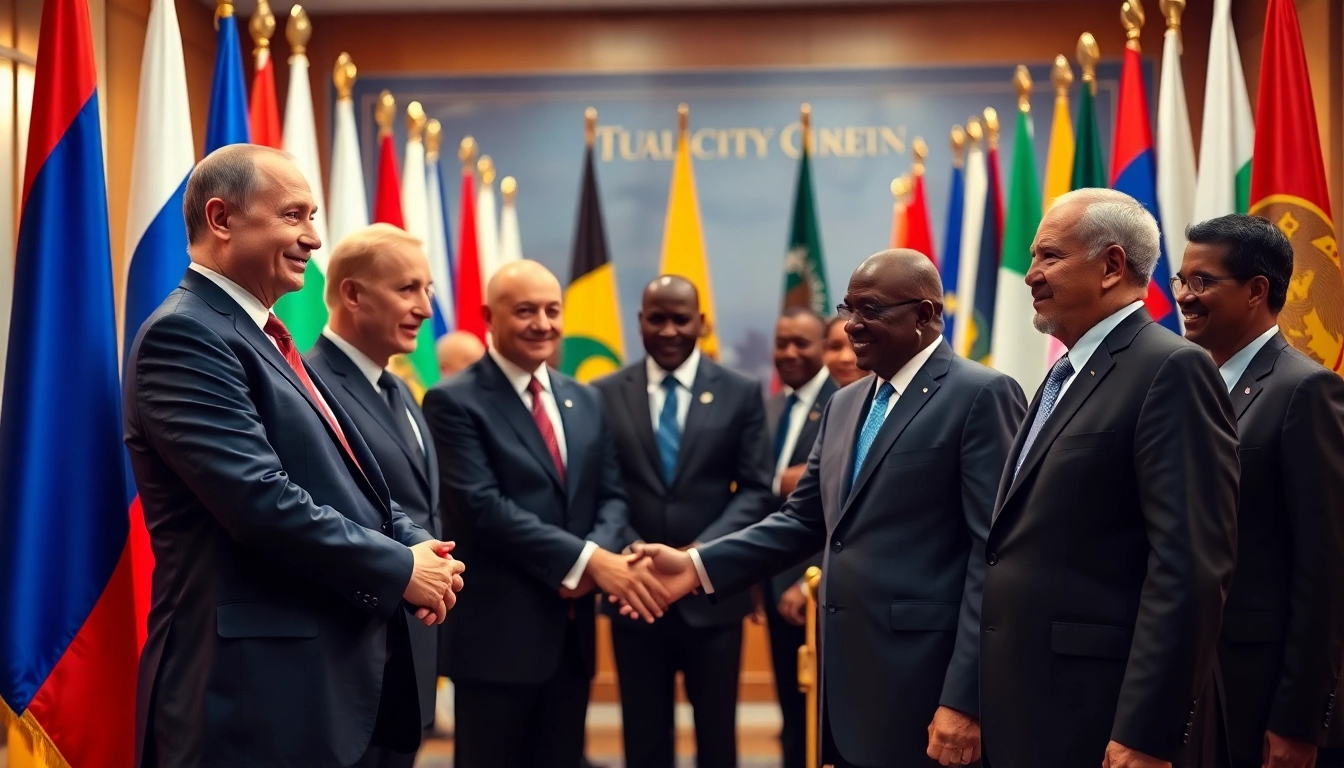Understanding the Context of Coöperation Russie Afrique
The partnership between Russia and Africa has evolved dramatically over the past two decades, driven by mutual interests in political stability, economic growth, and cultural exchange. This collaboration is characterized by a growing recognition of Africa’s potential as a key player in global affairs. Increasingly seen as a source of raw materials and market for goods, Africa’s role in the context of coopération Russie Afrique is garnering attention and investment from Russia. In this article, we will delve into the historical context, the key drivers behind modern cooperation, and the impact of global politics on these partnerships.
Historical Background of Russia-Africa Relations
The relationship between Russia and Africa dates back to the Soviet era, marked by political alliances and support for liberation movements. The Soviet Union provided military and educational assistance that helped shape several African nations during their struggle for independence. In the post-Cold War era, the relationship waned due to changing political agendas and economic instability in both regions. However, in recent years, there has been a resurgence in interest from Russia, particularly as African nations seek alternate partnerships in a multipolar world.
Key Drivers of Modern Coöperation
Several factors are driving the renewed interest in cooperation between Russia and African countries:
- Economic Opportunities: With the West facing economic sanctions and slowing growth, Russia is looking to Africa as a new economic frontier, aiming to establish trade agreements that benefit both sides.
- Strategic Alliances: Collaboration on matters such as security, arms trade, and energy projects solidifies strategic partnerships that are mutually beneficial.
- Political Support: In international forums, African countries often support Russia in its geopolitical maneuvers, providing a counterweight to Western influence.
Influence of Global Politics on Partnerships
The emergence of new global powers has shifted the economic and political landscape, particularly in Africa. With China, India, and now Russia all forming tight bonds with African nations, the continent is no longer merely an audience but an active participant in global affairs. This change requires a careful navigation of relationships, as African nations assess the benefits and risks of aligning with global powers that often have competing interests.
Economic Impacts of the Russia-Africa Alliance
The economic implications of the Russia-Africa partnership are profound and far-reaching. As both sides seek to enhance their economic prospects, various initiatives have been launched to drive growth and innovation.
Trade Agreements and Economic Growth
Trade agreements between Russia and numerous African nations have led to increased economic activity. These agreements allow for the exchange of goods such as minerals, oil, agricultural products, and technological services. For instance, Russia has engaged in major mining and energy projects in countries like Angola and Nigeria, providing valuable expertise and capital while securing access to essential natural resources.
Investment Opportunities and Challenges
Investment from Russian companies in Africa is on the rise, particularly in sectors such as energy, agriculture, and infrastructure. However, this influx of investment is not without challenges. Many Russian enterprises face obstacles such as bureaucratic red tape and corruption. Additionally, African nations must ensure that these investments translate into real economic benefits and do not foster dependency.
Technological Transfers and Innovations
A significant component of the Russia-Africa economic partnership is technological transfer. Russian innovations, particularly in fields such as agriculture, energy, and mining technologies, are crucial for modernizing African economies. Collaborative projects—such as joint ventures aimed at improving agricultural productivity—can help boost food security and contribute to sustainable development.
Socio-Cultural Dimensions of the Partnership
The relationship between Russia and Africa extends beyond economics; it encompasses rich socio-cultural exchanges that catalyze mutual understanding and goodwill.
Shared Values and Cultural Exchange
The historical ties forged during the Cold War have given rise to a shared understanding of struggle and resilience, enabling cultural exchanges that resonate deeply with both parties. Initiatives such as educational exchanges and cultural festivals promote the sharing of literature, art, and music, enriching both Russian and African cultures.
The Role of Education and Capacity Building
Education plays a pivotal role in the Russia-Africa alliance. Scholarship programs for African students studying in Russia not only enhance personal growth but also sow the seeds of future collaboration. These young leaders return home with new skills and perspectives, capable of making meaningful contributions to their societies and reinforcing ties between the two regions.
Public Perception in Africa and Russia
The perception of Russia in Africa is generally positive, underpinned by historical ties and a shared interest in resisting Western hegemony. Conversely, Russia views African nations as partners in navigating a multipolar world, where alliances are formed through solidarity and mutual benefit. However, the narrative must evolve to overcome skepticism and foster deeper trust between the constituents of both regions.
Strategic Initiatives and Future Prospects
Looking ahead, both Russia and African nations are poised to engage in strategic initiatives that promise to yield significant benefits.
Highlighting the Eastern Economic Forum
The Eastern Economic Forum (EEF) serves as a critical platform for Russia to showcase its intention to strengthen ties with Asia and Africa. Held in Vladivostok, this forum attracts leaders from various sectors, fostering dialogues on cooperation. African nations are increasingly participating, seeking opportunities for investment and collaboration across various industries.
Collaborative Projects in Health and Energy
Given the ongoing health challenges posed by the COVID-19 pandemic, collaborative health projects have gained importance in the Russia-Africa partnership. Investments in healthcare infrastructure and technology can aid in building resilient health systems across African nations. In the energy sector, Russia’s expertise in nuclear energy offers Africa an avenue to diversify its energy sources sustainably.
Anticipated Growth Areas for Engagement
The future of Russia-Africa cooperation lies in sectors like agriculture, technology, and renewable energy. Enhancing agricultural productivity through Russian agricultural technology—such as irrigation and crop genetics—can significantly improve food security in Africa. Similarly, renewable energy initiatives can help alleviate energy poverty while contributing to global climate goals.
Challenges and Criticisms of the Coöperation
Despite the positive aspects, the Russia-Africa partnership faces several challenges that must be addressed to ensure sustainable cooperation.
Geopolitical Tensions Involving External Powers
The increasing involvement of countries like the United States and European nations in African affairs poses a challenge for Russia. The geopolitical landscape is competitive, and African nations must navigate these relationships carefully to cultivate their interests without becoming pawns in larger geopolitical games.
Dependency vs. Mutual Benefit: A Debate
The question of whether the relationship fosters dependency or genuine mutual benefit is a contentious one. Critics argue that as Russia increases its military presence in Africa, particularly through arms sales, the risk of fostering dependency grows. On the other hand, proponents contend that the collaboration provides African nations with essential resources and technology needed for development.
Strategies to Overcome Challenges and Sustain Growth
To cultivate a robust partnership, both Russia and African nations must engage in transparent dialogue and develop strategies focused on mutual benefit. Implementing joint projects that emphasize long-term economic independence, capacity building, and innovation will be critical in transforming these relationships into sustainable and fruitful partnerships.



